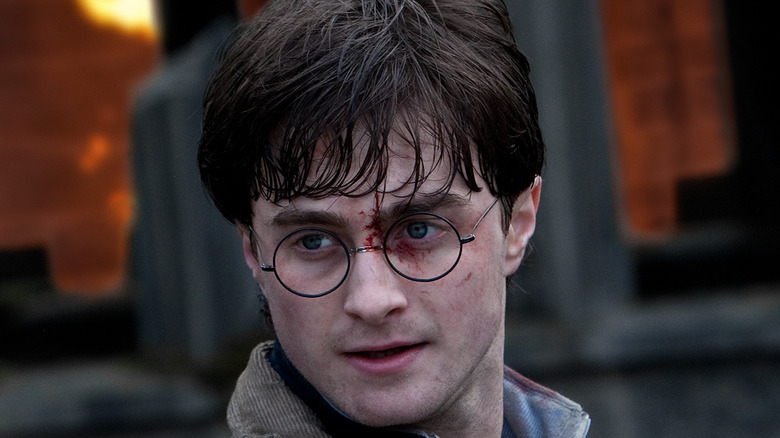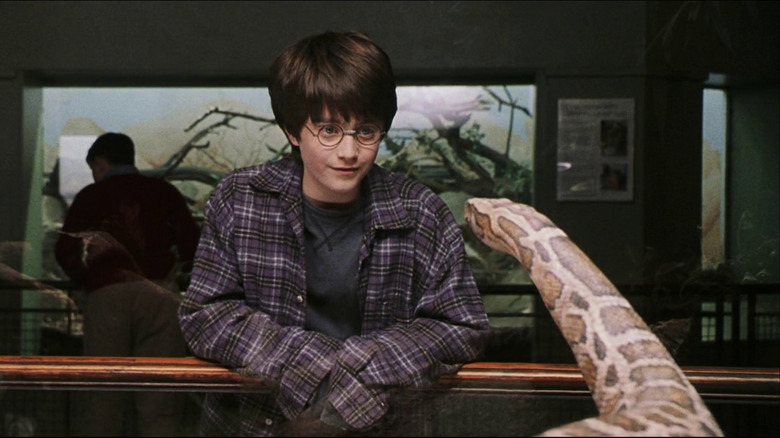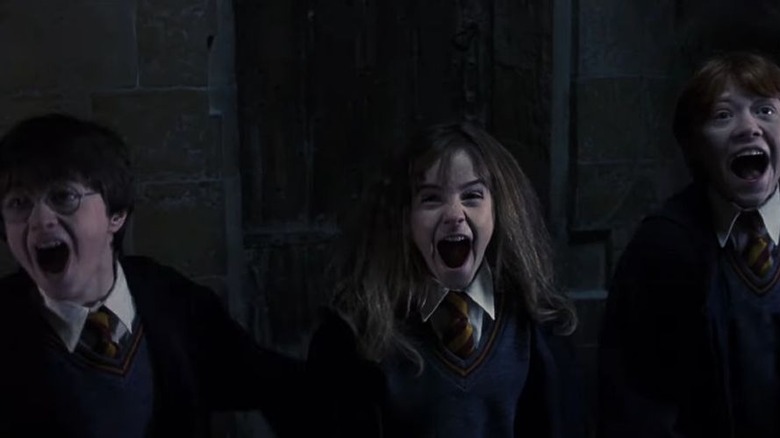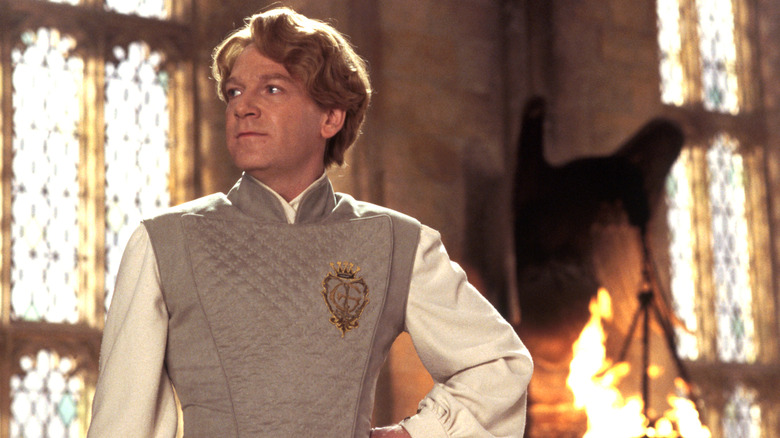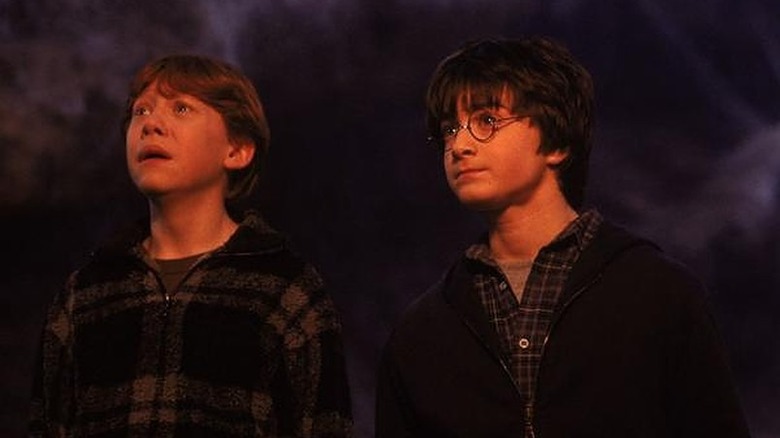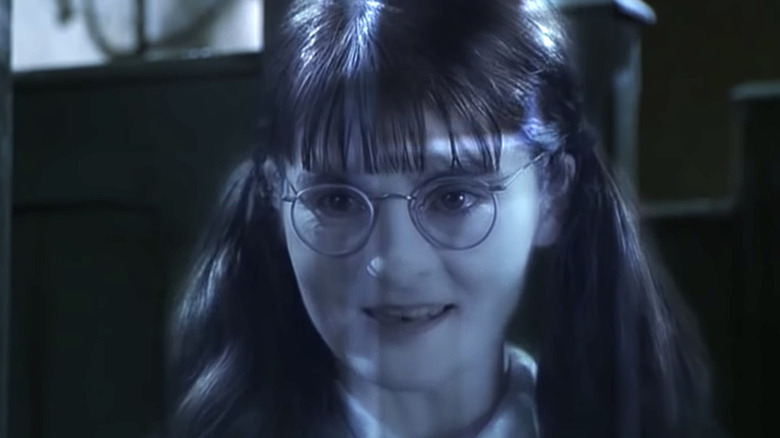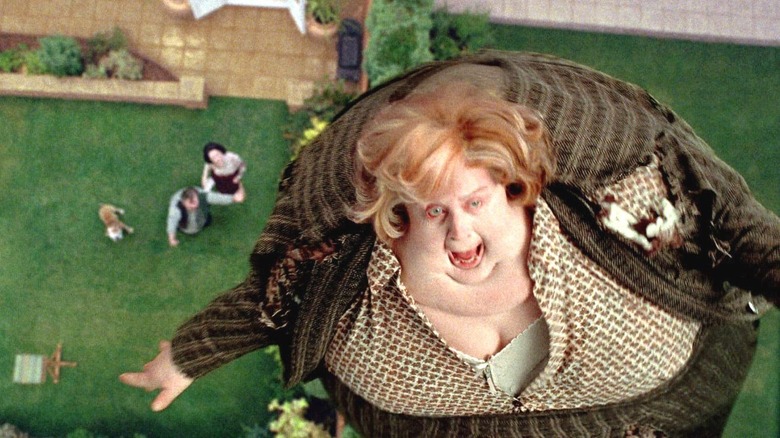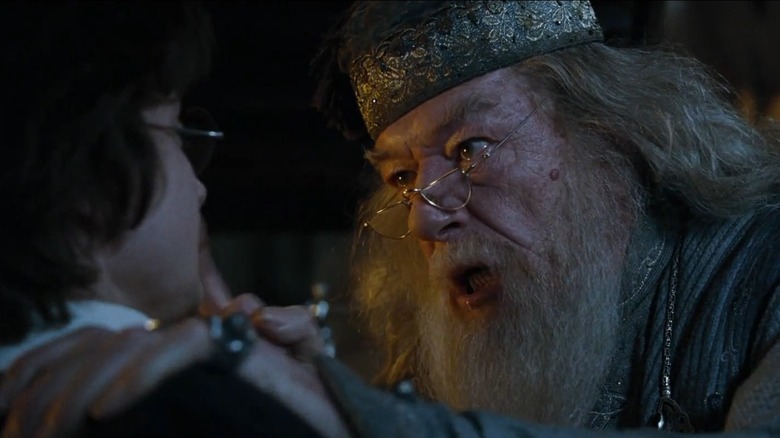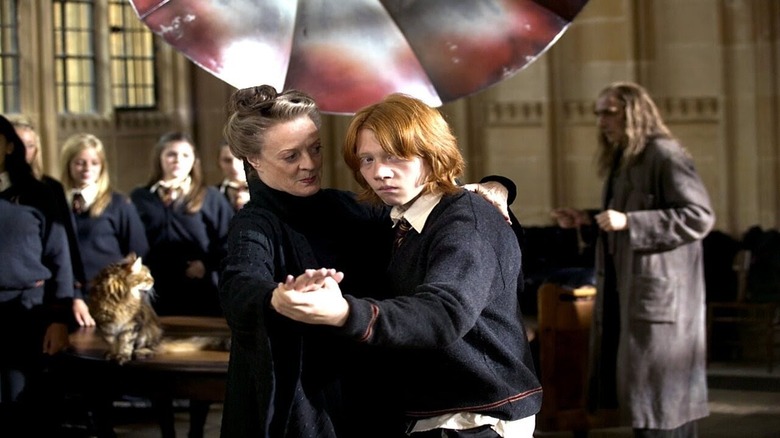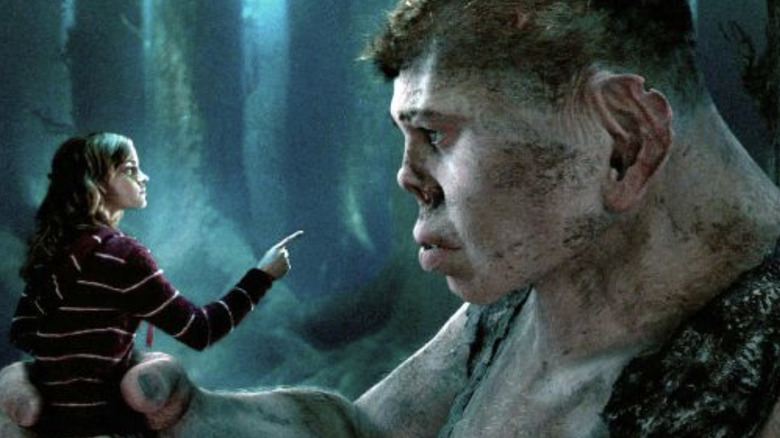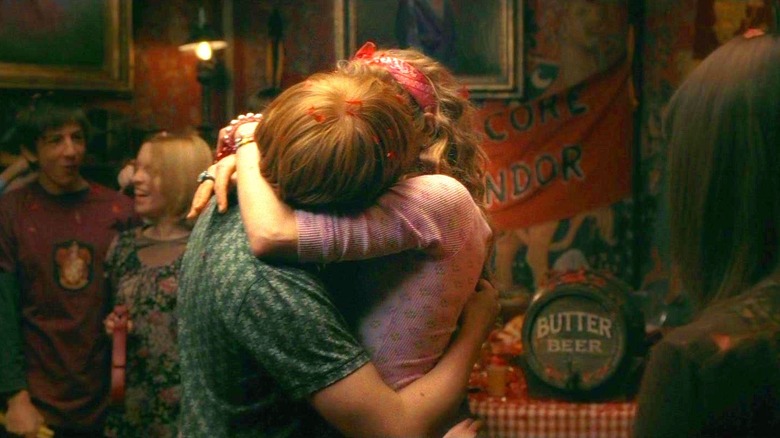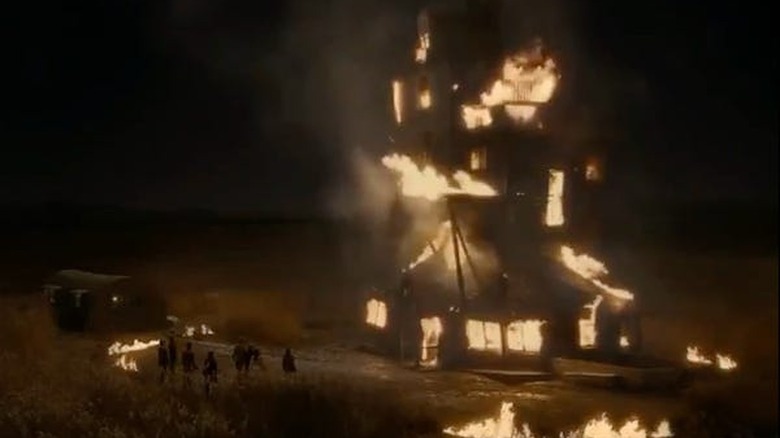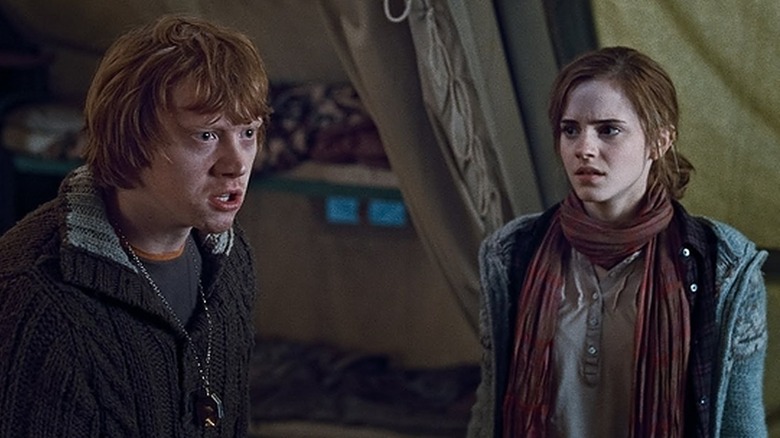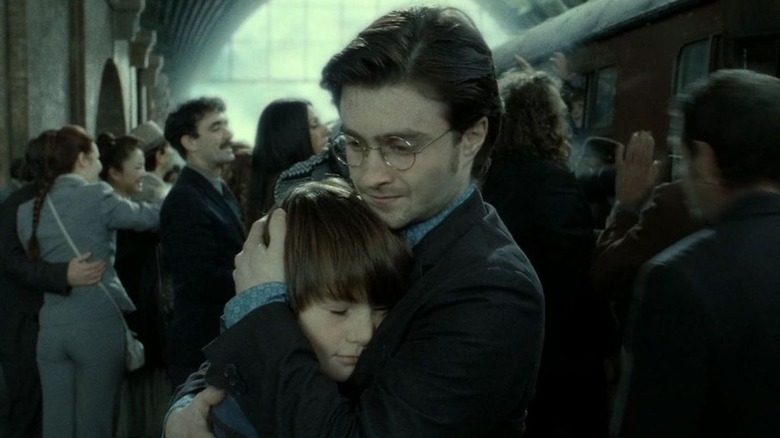The Dumbest Line In Every Harry Potter Movie
When it comes to films adapted from YA or children's books, "Harry Potter" stands out with witty and expansive scripts that make fans truly feel like they're about to board a train to Hogwarts. Rewatching the movies brings back all of the nostalgia and a yearning to be a part of the magic that makes Hogwarts feel like home. Few other series have captured that childlike wonder.
But while the films succeed in many ways, they sometimes let fans of the books down with significant changes that detract from the story rather than enhancing it. Overall, the movies certainly aren't perfect, and some of the dialogue is downright cringe-y. Anytime Aunt Marge or Lavender Brown speaks, fans want to gag and roll their eyes simultaneously. Other utterances and actions are more tangibly troublesome: Hagrid's love for magical creatures (which underpins much of his advice) is going to get someone killed one of these days, and Ron can be downright cruel when he's defensive.
While there's no place quite like Hogwarts, the "Harry Potter" movies are also home to some truly ridiculous, out-of-place, and uncomfortable lines. Did your favorite dumb lines make the cut?
'I've never talked to a snake before ... Do you talk to people often?'
Harry certainly has his clever moments, but he can be a bit lacking in the common sense department. Before he even learns about his magical powers, in "Harry Potter and the Sorcerer's Stone," Harry lets a snake loose at the zoo when the family celebrates Dudley's birthday. Here we first see Harry's ability to communicate with snakes when he conversationally asks the caged reptile if he "talks to people often."
Out of context, this is one of the most absurd lines in the series, and even knowing the circumstances, it's a pretty ridiculous thing to ask a snake. No, Harry, most people don't go around talking to snakes — not even at Hogwarts, as we later learn. All in all, Harry's snakescapades are pretty hilarious, especially when Dudley gets trapped inside of the exhibit. Still, Harry could use some notecards next time he strikes up a conversation with a serpent.
'Now, if you two don't mind, I'm going to bed before either of you come up with another clever idea to get us killed ... or worse, expelled!'
Hermione is about the least chill Hogwarts student there is. But sometimes, her love for education borders on the absurd. In a moment pulled directly from the book, after she, Ron, and Harry survive an encounter with the massive three-headed dog Fluffy in "The Sorcerer's Stone," Hermione is more concerned about getting expelled than she is about physically dying. And when you hang out with the likes of Harry Potter, you truly have to be prepared for death at the drop of a wizard hat.
In response to her rambling speech, Ron says, "She needs to sort out her priorities." Sure, Ron himself is often overdramatic, but he's definitely right about this one. Throughout the series, we do see Hermione work on said priorities, even going as far as ditching her final year of school to hunt down Voldemort. Yet despite her significant character growth, early Hermione is a lot to handle. Let's face it: Even "The Deathly Hallows" Hermione is hard to handle. Yet we still love the nerd.
'I didn't get rid of the Bandon Banshee by smiling at her!'
"Harry Potter and the Chamber of Secrets" is simply wrought with nonsense coming from our delightful Defense Against the Dark Arts imposter, Gilderoy Lockhart. While he's hoodwinked most of the Wizarding World's women, quite a few people see through his bravado — including none other than Ron Weasley. He may not have the book smarts of Hermione or the practical magical application of Harry, but Ron is incredibly intuitive and excels at calling B.S. when he glimpses it — and seeing through people's facades.
Granted, it's not particularly hard to see through Lockhart. After all, he makes his students take a quiz about his favorite color, and he thanks them for buying the dozen-plus of his books, which he forced them to buy for class. And the truth behind this particular line is, he didn't defeat the Bandon Banshee at all. He merely took credit for someone else's exploits. The guy is a charlatan to end all charlatans, but his Obliviate curse packs more of a punch than his smile — even when it's turned on himself.
'Why spiders? Why couldn't it be 'follow the butterflies'?'
Ron Weasley detests spiders. And who can blame him, especially after his encounter with Aragog in the dark forest? In "The Chamber of Secrets," we learn that Hagrid befriended a species of giant spiders when he first went to Hogwarts because, of course, he did. And as usual, he underestimates the bloodlust of his deadly friends. After Hagrid gets arrested for allegedly opening up the Chamber again during Harry's time at Hogwarts, it's up to Ron and Harry to figure out just what's going on — by following the spiders. Ron is less than pleased with this instruction from the groundskeeper.
Of course, the sentiment sounds bonkers out of context — follow the spiders? No thanks. Ron definitely has the right idea when he asks, "Why couldn't it be 'follow the butterflies?'" Just once, maybe Hagrid can befriend a creature that doesn't want to attack or murder children. Just once. The nonsense that Hogwarts staff get away with at this school is genuinely baffling — and Ron's goofy remark only reminds us how asinine these situations can really become.
'Oh, Harry ... If you die down there, you're welcome to share my toilet.'
Imagine being so miserable in life (and death) that you choose to spend eternity in a bathroom. As a teenage Hogwarts ghost, Moaning Myrtle is one of the greatest tragic figures at Hogwarts. Sure, she can be annoying at times. But Hogwarts has a habit of putting its students in undue harm and failing to close when it really should, and before The Battle of Hogwarts, Myrtle was another in a long line of on-campus causalities.
Between giving students deadly detention in the Forbidden Forest and holding events like the Triwizard Tournament, it's no surprise that at the hands of the Hogwarts administration, students often have to fight for survival. And though we're never meant to take Moaning Myrtle all that seriously, she's a symbol of everything that's wrong with Hogwarts.
Harry Potter is another student who puts himself in undue harm to clean up adults' messes, and right before he goes into the Chamber of Secrets, Myrtle welcomes him to share her toilet should he meet his demise. The line should be funny and a little creepy (seriously, someone needs to share a consent lecture with Myrtle, who frequently spies on the Hogwarts boys). But when you really understand Myrtle's story, the line doesn't function as it's meant to. Instead, you can't help feeling bad for the girl who never lived and who, afraid of death at such a young age, confined herself to a toilet for eternity instead of experiencing the next chapter.
'A little drop of brandy-brandy windy-wandy for Rippy-pippy-pooh?'
Anyone who has to listen to Aunt Marge in "The Prisoner of Azkaban" could probably use some brandy. In addition to the horrifying slew of gibberish she rails off to her dog Ripper when she offers him a drop of brandy, she also turns her incoherent babbling toward her nephew, Dudley. When she arrives at the Dursley house, she says, "Is that my Dudders? Is that my little neffy-pooh?" Not even Dudley seems charmed, and he adores being doted on.
Of course, things get sinister when she declares her approval of domestic violence: "I won't have this namby-pamby ... wishy-washy nonsense about not beating people who deserve it." In her case, she means "ungrateful" children like Harry. Anyone who has to spend more than a minute with the dreadful woman can't possibly blame Harry for losing his cool and accidentally blowing her up like a balloon.
She insults his dead mother, after all — and in true Dursley fashion, no one chimes in to stick up for Lily. Not even Petunia who, we learn throughout the series, had a complicated and once loving relationship with her sister. So when Harry defends his mother and finally silences a woman who has uttered enough dumb lines for all eight movies combined, even Minister of Magic Cornelius Fudge waves off Harry's worry that he'll get in trouble for using magic to do so — and that guy's no cherry himself.
'Harry! Did you put your name in the Goblet of Fire?'
Ah, yes. One of the most controversial moments in the "Harry Potter" film series. In "Harry Potter and the Goblet of Fire," an absolutely enraged Dumbledore roughs up Harry and demands to know if he put his name in the Goblet of Fire. Harry, who's wanted zero part of the fame thrust on him for being a resilient baby, obviously didn't put his name in the Goblet — a fact that book Dumbledore seems aware of when he asks Harry the same thing calmly.
Fans were already having a hard time accepting Michael Gambon as the replacement for the late great Richard Harris — who played Dumbledore's calm intellect and wit flawlessly in the first two films. If Gambon had won the role from the jump and made certain acting choices from the start, fans might not have rallied so hard against his portrayal of the wizened warlock. However, with a demeanor, a wardrobe, and a personality already in place, the changes are rattling.
In reality, we know that Dumbledore asks if Harry put in his own name out of obligation because there are onlookers, and he has to do his job. But let's not pretend he didn't know something else was up. Even more, despite his flaws, Dumbledore would never physically manhandle a student. In fact, he frequently calls out Umbridge for doing so in "The Order of the Phoenix." In all, the delivery of this line is uncharacteristic at best, and jarring at worst.
'Inside every boy, a lordly lion, prepared to prance.'
Okay, McGonagall, leave your creepy cis-normative speeches out of the classroom, please. Is there a wizardly way to say, "Okay, Boomer?" When Professor McGonagall teaches her class the art of dancing in preparation for the Yule Ball, she goes more than overboard with a slew of bizarre metaphors. And it's not just the boys that she has an odd pep talk for: The girls get the sentiment that, "Inside every girl, a secret swan slumbers, longing to burst forth and take flight." Um, McG, we love you, but this is straight-up nonsense.
Professor McGonagall is certainly the best professor at Hogwarts, even above Dumbledore, but she really misses her mark in this "Goblet of Fire" exchange. Not everything needs to be gendered — certainly not dancing. Additionally, not everyone who identifies as a boy feels strong and lion-y all of the time. Just like not everyone who identifies as a girl is a delicate swan. Can we move past these archaic notions?
'Grawpy, that is not polite! We talked about this. You do not grab, do you?'
The appropriate action when your literal giant half-brother is about to crush a teenager to death is definitely some light chastising ... right? Well, it is if you're Hagrid. A "Harry Potter" film wouldn't be a "Harry Potter" film if Hagrid weren't putting a wild amount of trust into equally wild creatures. It's in Hagrid's nature to believe the best in all creatures, even when they're putting others in danger.
Yet despite Hagrid's handling of Grawp in "The Order of the Phoenix" and thrusting the responsibility on the trio, there's just something inherently absurd about speaking to a 16-foot-tall giant like he's a misbehaving toddler, complete with diminutive nickname. Just because Grawp doesn't intentionally hurt anyone doesn't make a group of teenagers any safer when caring for a giant with known temper tantrum issues. You'd think Hagrid would have learned his lesson the first dozen times his similar schemes went wrong — but nope.
'That's my Won-Won.'
Did you sit in the movie theater for ten minutes after the "The Half-Blood Prince" credits rolled, thinking Ashton Kutcher would jump out of the shadows? If you thought you were being punked during the sixth "Harry Potter" film, you're not alone. When Lavender says, "That's my Won-Won," during a particularly uncomfortable romance scene, Hermione says, "Excuse me, I have to go vomit." Same, girl. Same.
"Half-Blood Prince" might as well have been the Ron and Lavender Snog Fest film, as their exploits take up half of the movie. Their excessive PDA makes everyone uncomfortable — whether they're actually in the film or an unfortunate fan watching the movie. But the bottom line? Why on earth would anyone use baby talk with someone they're making out with? What part of that is desirable or even tolerable? If you need to infantilize your relationship in order to have one, that probably means you're not mature enough to be dating — let alone pouncing on your boo in the middle of a crowded corridor.
Lavender never fails to act possessively, wildly erratic, and deeply inappropriate to Ron and his friends. But creepy baby talk aside, she only exists to further Ron and Hermione's arc, with no personality or motivations outside of Ron. Everything about Ron and Lavender's relationship is deeply problematic and unnecessary.
'I killed Sirius Black! You coming to get me?!'
While a good amount of "The Half-Blood Prince" feels like a fever dream, no scene takes the cake more than the bizarre and out-of-place attack on the Weasley Burrow that never even happens in the book. Calling back to the moment Bellatrix kills Sirius Black in "The Order of the Phoenix," Bellatrix prances around the Burrow property like a demented fairy, cackling about killing Sirius and taunting Harry to come and get her.
The scene is not only odd, but it was shot at a confusing angle that makes it feel like a dream — except it's not. The scene would almost make sense with Harry waking up in a sweat afterward, but nope. Bellatrix and company really burn down the Burrow while taunting Harry over something that happened the previous year as if no time has passed.
But even more, we never actually get any explanation as to how the Burrow is perfectly fine in the next film, standing tall for Bill and Fleur's wedding. Magic can do a lot, but when would the Weasleys have time to rebuild their home when they're on constant Order duty? There are so many unanswered questions stemming from a scene that does absolutely nothing for the film, while so many integral scenes from the books got the ax.
'No, you don't understand! Your parents are dead! You have no family!'
Imagine telling Harry "lone survivor" Potter that he doesn't know what it's like to worry about his loved ones. Ron has every right to be upset and on edge while his parents defy the Death Eaters in "The Deathly Hallows Part 1." However, Horcrux locket or no Horcrux locket, this was a jerk move, Ronald Weasley.
After Voldemort brutally murders Harry's parents, the Dursleys neglect and emotionally abuse him throughout his childhood until he arrives at Hogwarts. Once there, he develops bonds as strong, if not stronger, than family bonds. Harry hasn't felt love since his mother sacrificed herself for him when he was a baby. But not only does Harry find love with Ron and Hermione, but he also loses both Dumbledore and Sirius, who were both father figures to him. What's more, Harry has a supreme case of survivor's guilt: He feels responsible for the lives of everyone around him.
Every battle that a classmate takes part in, every Voldemort-related incident, Harry hangs on his shoulders. While Ron fears for the lives of his family, Harry fears for everyone. Harry has no blood family because he watched every single one of them die. So how could his supposed best friend yell such cutting words when he watched Harry go through it? Of course, Harry knows what it feels like — and you don't have to be blood to be family. The Weasleys are Harry's family, too.
'You were named after two Headmasters of Hogwarts.'
"One of them was a Slytherin," Harry continues this line, "and he was probably the bravest man I ever knew." Pump the brakes. Did Harry Potter just call Severus Snape the bravest man he knew? He sure did. During the "19 Years Later" flashforward in "The Deathly Hallows Part 2," the Golden Trio drop their kids off at Kings Cross. Young Albus Severus is having an identity crisis before Harry lets him know that he'll be loved no matter what house the Sorting Hat places him in.
And sure, that's some pretty significant character growth from the kid who hated all Slytherins when he was in school, but the name? That's something the fandom isn't ready to forgive anytime soon. It took a supreme amount of courage for Snape to double-cross Voldemort for so long, but those acts of bravery and his borderline-stalker obsession with Harry's mom don't erase his cruel actions — from torturing shy and depressed students like Neville to the verbal harassment he frequently sent Harry's way.
He ultimately led Lily to her death because he was willing to let people die when it wasn't a personal inconvenience — and then acted bravely just to ease his guilt and grief. To the exclusion of incredible characters like Lupin, Sirius, and Tonks, hearing Harry call Snape the bravest man he knew is a lot for fans to take. Snape is a fascinating character study, but nothing he did is admirable — not even the courageous bits. Intentions color our actions, and Snape's were never great.
